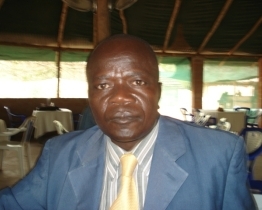Poor security affects education in Lakes’ Wulu
By Manyang Mayom
March 12, 2009 (RUMBEK) – The poor security environment in Wulu in Lakes state has hit education in the county, which is served with four payams, 13 bomas as well as 36 primary schools and one big secondary school renowned for its service to the Jur-beli communities, said the county education director.
 Wulu County’s administration was set up in 2005 following the Comprehensive Peace Agreement (CPA) that created the regional government of Southern Sudan. The county, one of eight in Lakes State, is located southward of Rumbek Central County.
Wulu County’s administration was set up in 2005 following the Comprehensive Peace Agreement (CPA) that created the regional government of Southern Sudan. The county, one of eight in Lakes State, is located southward of Rumbek Central County.
According to the Wulu education director, William Koji Kirjok, education is most affected by the inter-tribal battle that happened in January between Dinka Agaar of Rumbek East County and Jur-beli of Wulu County.
Most children are reported absent from school. A large number of students fled to Western Bhar El-Ghazal state during the clashes but only a small number of students has returned back home. Classes are going to open in April but no children have enrolled into their new classes, apparently because of the inter-tribal conflicts.
“Wulu is a backward county in education,” said the Wulu County Commissioner, Lieutenant Colonel Gideon Shulur Mbele in an interview Wednesday. “Education in Wulu is indeed behind; even though 36 primary schools are serving the county, still there are not enough teachers while also getting quality teachers is very difficult.”
Kirjok said that “Wulu County has enrolled 9,656 public school students in 2008 within 36 primary schools. The teachers are comprised of Sudanese and Kenyans in Wulu but now there is fear for foreign teachers in Wulu due to the atmosphere of threat from pastoralists of Rumbek East, in case of an attack.”
The education director appealed to Wulu natives to return home, saying the insecurity situation has been restored back into normal due to protection from military police patrolling in the areas during day and night.
“Economically and socially, Wulu youth confrontations have been cracked down on and that will give high time to the government of Lakes state to rebuild better understanding with Wulu natives,” said Kirjok, referring to the “youth” who engage in the clashes.
INSECURITY
Commissioner Mbele said that inter-tribal fighting last January started at his own house in Wulu and then spread outside. The conflict has killed 12 people while houses were seriously looted during the fighting.
This conflict in Wulu started over a cattle theft in a place called Wako that resulted in the wounding of one woman plus one child. In a revenge attack, another person was shot dead while fishing in the river called Dibu; the fighting also killed the sub-chief of Makurdur Payam, Daniel Chiwar, on March 1, 2009. That resulted in the killing of an SPLA soldier in the following days, who was a bodyguard belonging to an SPLA officer called John Tiiu, said the official.
Meanwhile, Mbele said “we have to search for rule of law to govern Southern Sudan; first rule of law seems weak because police are not well equipped or trained properly to manage civilian affairs.”
He said that one thing that annoys him is the killing of a pregnant woman who was walking with her four children in Makudur Payam last week.
He also accused policemen of taking sides during the inter-tribal fighting in Wulu; the policemen themselves looted the properties of civilians during the day on which gunfire was exchanged. He pointed especially to shops plus a few houses which are nearby the police station. Some looters even used tripper trucks and lorries to take the stolen materials but police failed to capture them or identify them.
Referring to the aftermath of the clashes, Mbele affirmed that “nowadays, all my culprits accused of killing as well ring leaders are captured and placed into custody waiting for investigations but I do not know whether my colleague, Chirillo Majok Mading, the commissioner of Rumbek East, has done so to bring in his accused culprits into custody.”
“Moreover, my house in Rumbek Central County was burned down by an unknown group within Rumbek town at Malakia during the midnight as well as the house belonging to Lakes State Gender Advisor Hon. Asunta Buoda who hails from Wulu county,” said the commissioner.
Furthermore, he concluded the interview by saying that “this is not the first time that we Jur-beli communities been mistreated by Agaar sons,” referring to several years ago when Jur-beli youths became the target of angry beatings by Dinka Agaar in reprisal for a car accident that killed an Agaar called Maker Moses Majok. He said that military personnel were involved in the beatings, including even some Jur-beli.
“We need peace for all and not peace for one side,” said Mbele. “Why, what is the problem that Jur people become victim daily in Agaar community while we are part of Lakes state?”
INFRASTRUCTURE
Communication in Wulu County is very difficult due of no network coverage in the county, except for the small telephone network of Canar which has been supporting the county since 2008.
Looking at the situation on the ground, Wulu county has poor infrastructure. Only the Wulu police station and commissioner’s office are properly built well. Most communities are drinking dirty water from dug wells while there are only a few hand-pumps that provide clear water.
There is no electricity in the county. But according to a local medical staff who spoke Monday, there is good healthcare with no report of HIV/AIDS.
(ST)
